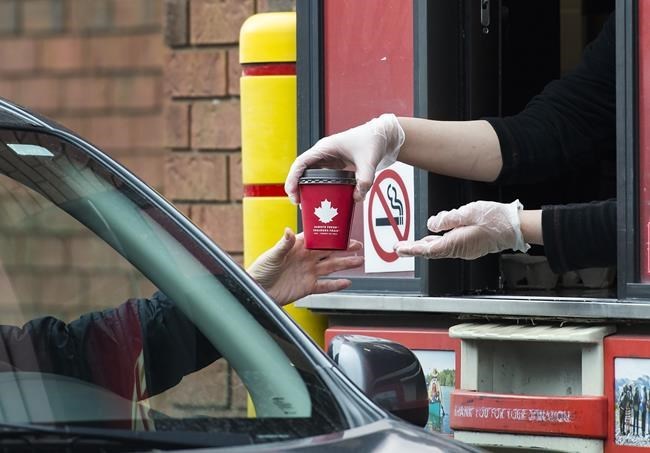Tim Hortons' sales are up, but continue to lag pre-pandemic highs amid a stalled reopening that's left office towers, and the company's downtown locations, largely deserted.
The coffee and doughnut chain's urban restaurants are struggling with a lack of foot traffic from workers — many of whom are coveted "high frequency customers" that buy food and drinks multiple times a day.
But a different story is unfolding at rural and suburban locations, where restaurants are bustling and drive-thrus busy, even as labour shortages make hiring a challenge.
"There's a clear, concentrated drag from urban and super urban locations in our business," said José Cil, chief executive of Restaurant Brands International Inc., the company behind Tim Hortons, Burger King and Popeyes.
Despite strong momentum early in the summer, he said rising COVID-19 cases tied to the Delta variant and renewed public health measures paused reopening plans and slowed the restaurant's recovery.
"Downtown Toronto, as an example, is still not back to work," Cil told analysts during a conference call. "Many of the large employers have pushed back returns to (the) office to sometime in 2022."
The comments came as Restaurant Brands reported its third-quarter profit rose compared with a year ago and its revenue climbed more than 10 per cent.
The dichotomy between sales performance at different locations underscores the uneven recovery as consumer habits continue to be shaped by the pandemic. Tim Hortons is also grappling with labour shortages, supply chain disruptions and rising costs — issues plaguing the restaurant industry across the country.
Restaurant Brands chief financial officer Matt Dunnigan said the parent company is dealing with a "tougher cost environment" from general inflation and staffing wages.
He said prices have been impacted by inflation and the company is looking to simplify menus to help with labour pressures.
Tim Hortons recently launched a national campaign to hire more front-line restaurant workers across the country.
Restaurant Brands chief corporate officer Duncan Fulton said Tim Hortons franchise owners "would love to rehire as many people as they can possibly find."
Many locations are offering recruitment bonuses for existing employees who recommend a friend to join the company, while others have launched new hire bonuses that provide an incentive for new workers after a certain period of time, he said.
"I know there are a lot of restaurant owners that are paying in excess of minimum wage," Fulton added in an interview. "All those efforts are in response to the competitive landscape out there."
As for menu price increases, he said adjustments are made "very carefully and very thoughtfully" to keep up with inflation.
But Fulton said Tim Hortons is focused on staying competitive, and is insulated from some of the higher commodity prices and supply chain issues due to its scale and long-standing relationships.
"We are fortunate to have very large scale in the purchases that we make, so it gives us the ability to lock-in favourable prices," he said. "We also have a sophisticated supply chain team that has long-standing, multi-decade relationships with both suppliers and transportation providers."
Restaurant Brands, which keeps its books in U.S. dollars, said it earned US$221 million in net income attributable to common shareholders or 70 cents per share for the quarter ended Sept. 30, up from US$145 million or 47 cents per share a year earlier. Revenue totalled nearly US$1.5 billion, up from US$1.33 billion in the same quarter last year.
The increase came as comparable sales rose 8.9 per cent at Tim Hortons and 7.9 per cent at Burger King. Popeyes saw a drop in comparable sales of 2.4 per cent.
On an adjusted basis, Restaurant Brands said it earned 76 cents per diluted share in the quarter, up from 68 cents per diluted share a year ago. Analysts on average had expected a profit of 74 cents per share, according to financial markets data firm Refinitiv.
This report by The Canadian Press was first published Oct. 25, 2021.
Companies in this story: (TSX:QSR, TSX:QSP)
Brett Bundale, The Canadian Press



